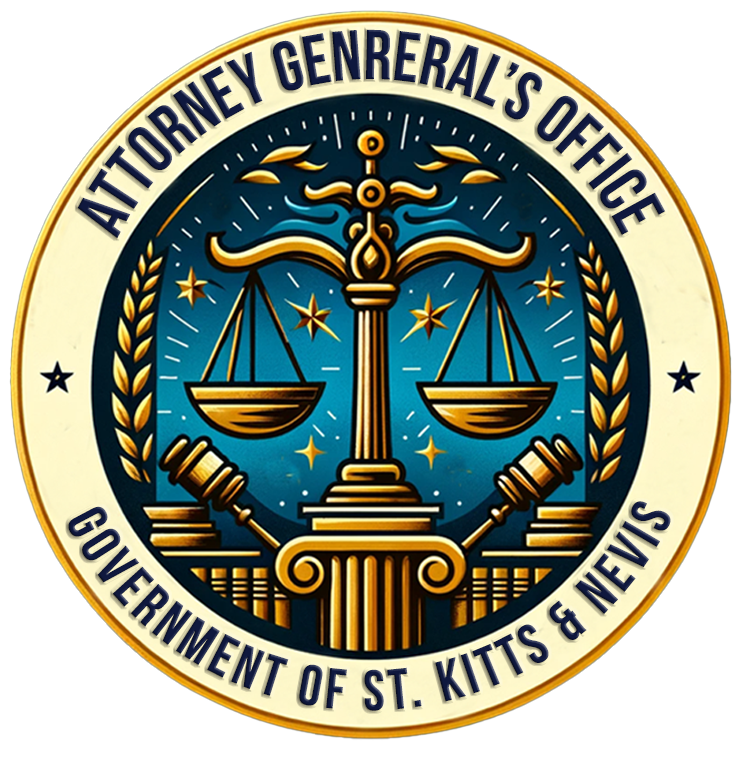Magistrates Court Registry
Who We Are
The Magistrate Court is a significant component of the judicial arm of governance which is provided for as part of our Constitution. It can be described as a summary court and also as a lower court. As such it exercises jurisdiction in cases of less serious criminal matters and civil matters within a limited monetary value range.
It also acts as a conduit for more serious criminal matters to be processed upward to the higher courts. However, in some cases, matters that are typically dealt with in the higher court by a judge and jury can be tried summarily in the Magistrate Court if the accused is prepared to submit to a summary trial.
The Magistrates Department falls under the Ministry of Justice and Legal Affairs. The Department is headed by a Senior Magistrate who is assisted by four other Magistrates. The Magistracy is divided into three (3) Districts. Three (3) Magistrates serve District A covering the City of Basseterre. One (1) Magistrate serves District B (outside of Basseterre on St. Kitts). One (1) Magistrate serves District C on the island of Nevis.
The administrative operations of the Court are carried out by a complement of 23 staff members under the supervision of the Senior Magistrate. On St. Kitts eighteen (18) staff members are accommodated at the Sir Lee Lewellyn Moore Judicial Complex in Basseterre. They consist of an Assistant Secretary, Executive Officer, Senior Clerks, Junior Clerks, Stenographer, Bailiffs, Messenger, and Office Assistant. On Nevis five (5) staff members are accommodated at the Magistrate Court section of the Police Station in Charlestown. They consist of an Administrative Assistant, Executive Officer, Junior Clerk, and Bailiffs.
Our Mission
To adjudicate civil and criminal cases and to ensure a free and fair justice system
Magistrates have jurisdiction to hear and determine a broad range of legal issues pertaining to both criminal and civil matters. Our jurisdiction is derived in accordance with the provisions of the Magistrates Code of Procedure Act Cap 3.17 of the Revised Laws of St. Christopher and Nevis.
Matters dealt with include:
- Hearing of cases and delivering judgment in relation to Summary Criminal Matters;
- Imposition of Penalties/Fines or Sentences in Summary Criminal matters;
- Hearing and settling of disputes in Civil Matters involving amounts up to a value of $25,000.00 (or higher in special cases);
- Maintenance Orders;
- Domestic and Juvenile Matters.
- Custody and child protection responsibilities where necessary.
- Court of Petty Sessions, re Granting of Liquor Licenses.
- Convening Committal Proceedings in relation to criminal matters that need to be tried in the High Court;
- Hearing of matters relating to distress;
- Consideration of Bail Applications
- Vehicle and Road Traffic Court;
- Summary Jurisdiction (Quasi- Criminal) Protection and Maintenance of married woman and children;
- Matters relating to salvage and wrecks;
- Coroner’s Inquest or Inquiry Matters
When the Court Functions
In District A the courts sit daily. In Districts B and C, respectively, the courts sit on Mondays, Tuesdays and Fridays.
The operations of the court are financed by budgetary allocations via The Ministry of Justice and Legal Affairs as outlined in the Annual Estimates and Budget of the Government of St. Kitts and Nevis.
Most of our court hearings are carried out in ‘open court’.
Our administrative operations cater to processing of all matters for consideration by the Court.
We provide persons and, or their solicitors with available samples of court forms on request.
Individual parties (and their counsel where necessary) are also given adequate notice regarding the hearing of their particular matters.
The public is informed regarding the dates and times when the court sits. This is done by the timely publication/circulation of Court Lists.
While collecting and filing all documents given to the court, we check to ensure that all material particulars (including proper addresses, signatures, correct case numbers and correct fees, etc.) are included in the documents. We also answer questions regarding the court proceedings and rules of the Court.
The Court staff personnel provide help or advice to persons who do not have legal representation and assist them in completing the necessary documents pertaining to their case. However, we cannot engage in advising whether or not to pursue any legal action.
Our Bailiffs undertake the service of civil court documents and execute warrants in civil cases.
Who We Mostly Interact With
A variety of persons interact with the court as:
- Plaintiffs
- Complainants
- Prosecutors
- Lawyers/Attorneys
- Defendants
- Applicants for Licences
Examples of Criminal Matters Dealt With (List not exhaustive)
- Assault
- Battery
- Wounding
- Making Use Of Indecent Language
- Public Nuisance
- Housebreaking
- Larceny
- Aiders and abettors in offences punishable on summary conviction
- Annoyance in public place
- Possession of Illegal Arms and other offensive weapons
- Assault
- Disorderly conduct
- Dangerous Driving and Riding
- Drunkenness
- Escaping From Legal Confinement or Custody
- Malicious Setting of Fires
- Gambling
- Harbouring thieves, etc.
- Indecency
- Malicious damage
- Public Nuisances
- Hindrance or Obstruction of Police
- Posting placards and defacing buildings, etc.
- Prostitution
- Refusal to assist police officer, etc.
- Refusing to give name, etc.
- Riotous conduct
- Rogues and vagabonds
- Receiving and being in possession of property stolen or unlawfully obtained
- Making Use of Threatening Language
- Throwing Missile in Thoroughfare
- Trading on Sundays, etc.
- Trespass on Land, etc.
- Vagrancy
- Burglary
- Unlawful Breaking and Entering
- Vagrancy with Burglars Tools or with arms, etc.
- Assaulting or Resisting the Police
- Violence
- Control of Music in Public Places
Statutory Offences
Incidences of failure to conform to certain requirements under particular laws are also construed as criminal offences. Examples of this are traffic violations and specified breaches under the Social Security Act.
Extradition Matters
Magistrates are also vested with the power to deal with extradition matters as it relates to fugitive criminals.
Examples of Civil Matters Dealt With
- Nuisance
- Assault
- Battery
- Personal injury
- Defamation
- Child Maintenance
- Landlord and Tenant Matters
- Debt Owed to Plaintiffs by Defendants (including Contributions Owed to Social Security)
- Breach of Contract
- Negligence
- Private Nuisance
Forms In Use (List not exhaustive)
(Asterisk identifies a form that can be used by the public. The other forms are completed internally by court officers and are typically signed by a Magistrate)
- Certificate for Liquor Licence
- Complaint Without Oath (Access To Child)
- Complaint Without Oath (Child Maintenance Arrears)
- Complaint Without Oath (Discharge of Access Order)
- Complaint Without Oath (Father of Child)
- Complaint Without Oath (Neglect of Maintenance of Wife)
- Complaint Without Oath (Throwing Missiles)
- Complaint Without Oath (Varying of Child Support)
- Form 7B Order on Parent or Guardian to Pay Fines Damages Costs
- Form 37 Summons To Appear (Defendant) (Civil)Page 1
- Form 37 Summons To Appear (Defendant) (Civil) Page 2
- Form 38 Summons To Give Evidence
- Form 38 Summons To Give Evidence (b)
- Form 41 Commitment In Judgment Summons (Civil) Page 1
- Form 41 Commitment In Judgment Summons (Civil) Page 2
- Form Of Summons Under Section 5 Rent Arrears and Repossession Page 1
- Form Of Summons Under Section 5 Rent Arrears and Repossession Page 2
- Judgment Summons (Civil) Page 1
- Judgment Summons (Civil) Page 2
- Warrant Of Commitment For Default
- Maintenance Arrears
- Summons In Maintenance
- Summons To Defendant (Assault)
- Summons To Defendant (Making Use Of Indecent Language)
- Summons to Defendant (Making Use of Threatening Language)
- Summons To Defendant (Wounding) (Small Charges Act Cap 4.36)
- Summons To Defendant (Wounding)
- Summons To Witness
- Warrant Of Commitment (Child Support)
- Warrant Of Possession Under Section 8






